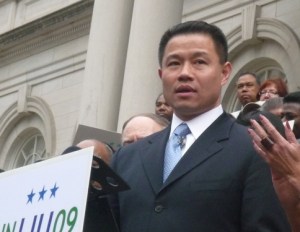Liu Wants To Change Community Benefit Agreements, Development Subsidies
By Eliot Brown February 10, 2010 9:59 pm
reprints For the second time in as many days, Comptroller John Liu has announced plans to revamp a process related to real estate development.
For the second time in as many days, Comptroller John Liu has announced plans to revamp a process related to real estate development.
On Tuesday, he called for general changes to the way subsidies are awarded
Wednesday belonged to community benefit agreements, the un-regulated deals often struck between eager developers and community groups concerned about their projects, usually after concessions and money have changed hands.
Calling the unstructured employment of CBAs in New York City an “embarrassment,” Mr. Liu, without offering much specificity, said in a statement that he would create new standards for the agreements “in the coming months.”
There’s much criticism to go around about CBAs in New York: Just who sits at the table to negotiate with the developer (i.e. who represents the “community”) is always subject to debate, and the same elected officials who are approving the project are often negotiating the CBAs as well. The CBAs, which usually have nothing to do with zoning, have become a prerequisite nonetheless for a necessary zoning approval, a common complaint from developers.
Here’s Mr. Liu’s full statement.
Community Benefit Agreements have become commonplace whenever private developers seek public assistance, ranging in form from tax subsidies and no-bid contracting to zoning changes and invocation of eminent domain. In the absence of standards, however, these agreements will become more problematic and ultimately irrelevant.
From Atlantic Yards to Yankee Stadium to the Columbia University expansion, the public has seen a string of broken promises to communities and questionable involvement by some government officials. Furthermore, an additional layer of unpredictability confronts developers when they engage in private negotiations over benefits associated with their projects. In fact, studies have singled out New York City’s community benefit agreements as examples of what not to do.
It is time for this embarrassment to end. In the coming months, I’ll establish standards for community benefit agreements that are accountable, transparent, consistent and inclusive. To that end, I will form a task force including business, labor and community representatives that will thoroughly examine the issue of community benefit agreements and propose best practices. It is simply common sense to have clear standards that ensure benefits for the public when private developers receive benefits from the public. I look forward to working with the Mayor and the City Council to implement a new approach that will place our city at the forefront of community engagement in economic development projects.
On Tuesday, the comptroller also set the stage to introduce some changes to the process surrounding public subsidies for developments. Many developers get tax breaks or other subsidies through the Industrial Development Authority, a city-controlled board on which the comptroller has a seat. At the IDA meeting Tuesday, he voted against the items on the agenda on principle (subsidies to build supermarkets in low-income neighborhoods), saying he has criticisms with the process. Again not mentioning many specifics, he said he wants to “establish consistent standards” for review, and suggested he wants to have more ability to examine the projects himself.
Here’s the statement he delivered at the IDA:
These projects contain plenty of merit, when viewed individually on their own, and provide benefits to the community through the use of stimulus funds and job creation. However, there is concern that the current system may not include clear processes and standards for project development and approval. My vote today is not a judgment on these projects, but rather reflects the need to examine how scarce public resources are used to advance our City’s economic development.
Although my dissenting votes today do not change the actions expected from the Economic Development Corporation (EDC), the votes will better enable me to help establish consistent standards and transparent processes when ascertaining which economic development projects deserve subsidies from the city, as well as better enable my office to review individual projects if the need for such review should arise. I look forward to forging a healthy relationship with the EDC to establish a standardized system of review to create a more transparent and accountable process so the City can responsibly support only the most deserving projects in a way that efficiently prioritizes the allocation of scarce resources.



